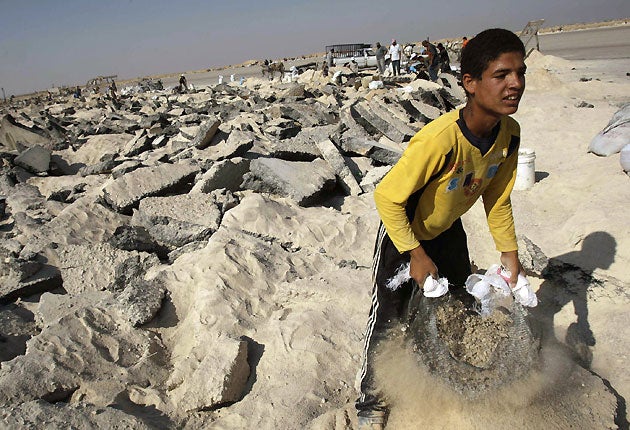Israel says it will ease Gaza land blockade

Israel agreed today to ease its land blockade on the Hamas-ruled Gaza Strip, hoping to quell growing worldwide outrage following a deadly raid on an international flotilla bound for the Palestinian territory.
In one of the major changes, Israel will now allow in more desperately needed construction materials for civilian projects, provided those projects are carried out under international supervision, government and military officials said. Israel has barely allowed in materials such as cement and steel, fearing Hamas militants could use them to build weapons and fortifications.
That policy has prevented rebuilding after Israel's brief but fierce war with Hamas in Gaza last year.
An Israeli military official told The Associated Press that all foods would be freely let in to Gaza, effective immediately. Israel has previously allowed a narrow and constantly changing list of authorized food items.
A brief government statement announcing today's decision also indicated the naval blockade on Gaza would remain in force.
Israel will "continue existing security procedures to prevent the inflow of weapons and war material," it said. Prime Minister Benjamin Netanyahu has repeatedly warned that if the naval closure is lifted, then the Iranian-backed Hamas would turn Gaza into an "Iranian port."
There was no mention of lifting or easing bans on exports or the import of raw materials that would be crucial to galvanizing the territory's battered economy. And the statement contained no specifics on what else would be allowed into Gaza.
But the fact that Israel was forced to respond to an international outcry over the blockade was evidence of the intense pressure the country's leaders felt.
The European Union cautiously welcomed the decision.
"This is a step in the right direction," said Cristina Galach, spokeswoman for the bloc's Spanish presidency.
The EU's foreign policy chief, Catherine Ashton, said officials wanted to see how the Israeli decision is carried out. "The detail is what matters," she said.
Israel must "make sure that many, many more goods can get in to Gaza to enable people to reconstruct their homes, to build schools, to place infrastructure, and also enable people to get on with ordinary lives," she said.
UN spokesman Chris Gunness said the blockade has prevented the United Nations from bringing in construction materials needed to carry out an internationally approved plan to rebuild thousands of homes and other buildings Israel damaged or destroyed in last year's war in Gaza.
The closure has also shuttered hundreds of factories, put tens of thousands of people out of work and brought the territory's fragile economy to a standstill, mainly hurting ordinary Gazans.
EU officials will discuss the possibility of helping reopen Gaza's border crossings, Ashton added. The EU helped monitor Gaza's southern border with Egypt until Hamas took power in 2007.
The partial lifting of the siege did not satisfy Hamas.
"We want a real lifting of the siege, not window-dressing," said Hamas politician Salah Bardawil.
Israel, with Egypt's cooperation, imposed the blockade three years ago after Hamas, which calls for Israel's destruction, violently wrested control of Gaza. For the most part, only basic humanitarian goods have been allowed in.
But the blockade failed to achieve its aims of stanching the flow of weapons to Gaza, weakening Hamas or winning the release of an Israeli soldier held in captivity in Gaza for years. A network of smuggling tunnels under the Egypt-Gaza border became a conduit for both weapons and commercial goods sold at black market prices. Gazans sank deeper into poverty, turning their anger against Israel and not their Hamas rulers.
Israel drew new scrutiny of the embargo when it sent naval commandos to stop a blockade-busting flotilla in late May. The troops clashed with activists on board one of the ships, killing nine Turks. Both sides said they acted in self-defence.
In the West Bank, the rival pro-Western Palestinian government of President Mahmoud Abbas also criticized the Israeli decision. Negotiator Saeb Erekat said the closure should be ended altogether. "The siege is collective punishment and it must be lifted."
Amid the heavy international criticism that followed the Israeli naval raid, Egypt opened its land border crossing with Gaza — the main gateway for some residents to enter and exit the crowded territory.
But most Gazans remained confined to the territory. Egypt is only letting in people with special travel permits, such as students and Gazans with foreign passports. In the past two weeks, only 10,000 Gazans have crossed into Egypt.
On Sunday, the Israeli commission appointed to investigate the flotilla attack met for the first time. Two international observers are to join the deliberations later.
Join our commenting forum
Join thought-provoking conversations, follow other Independent readers and see their replies
Comments